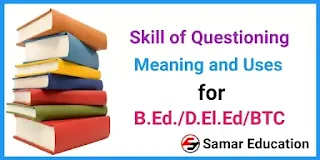Meaning of Skill of Questioning | Components of Questioning Skill
Meaning of Skill of Questioning
The skill of asking questions in the class-room teaching is very important. By asking questions again and again, the teacher makes the pupils more thoughtful. He enable the pupils to understand the subject deeply. Probing questions are those which help the pupils to think in depth about the various aspects of the problem.
Use of Probing Questions
The teacher can use the probing questions in the following situations:
1. When a pupil expresses his inability to answer some question in the class or his answer is incomplete, then, the teacher can ask such questions which prompt the pupils in solving the already asked questions.
2. When the pupils answer correctly in the class but the teacher wants to seek more information, this technique is known as "Seeking Further Information' technique.
3. Sometimes, the teacher may ask probing questions to concentrate the attention of the pupils. Similarly, the teacher may ask the same question from other pupil. This is known as 'Re-focusing".
4. If the teacher wants to introduce the pupils with various aspects of the problem, he can ask the same question after slight changes in the language. This technique is known as 'Redirection'.
5. The teacher can ask questions bearing 'why' in order to develop the reasoning power of the pupils. By getting motivated from such questions, pupils involve themselves in the process of reasoning. This technique is known as 'Critical Awareness' technique.
Components of Questioning Skill
1. Prompting:- The teacher can ask questions when the pupil expresses his inability to answer or accepts frankly that "he does not know". In probing questions, pupils get some prompting regarding the answer.
2. Seeking Further Information:- In class, when the pupils are, unable to answer any question or answer partially, then in order to receive complete and correct answer, the teacher can ask probing questions by accepting that the answer given is correct, but the pupil should reveal more. There can be alternate answer to the asked question. In this way, the teacher can seek maximum information from the pupils.
3. Refocussing:- Sometimes, the teachers are not satisfied with the pupils' answers. They draw the attention of the pupils towards different situations where the similar problems can arise. This makes the transfer of learning possible.
4. Redirection:- The teacher tries to develop the reasoning power in the pupils by asking various questions. This enables him to encourage the pupils for maximum participation.
5. Critical Awareness:- By asking the questions bearing 'Why' and 'How' the teacher can develop critical awareness in the pupils.
Components of Probing Question Skill
- Prompting questions were asked.
- Questions seeking further information were asked.
- Re-focussing questions were asked.
- Redirection was done.
- Questions to create critical awareness were asked.
How to Plan Questions?
There are specified ways and steps through which the formulation of questions is done. These ways or methods stand good in every aspect. Following are the steps followed for the formulation of questions:
- First of all, decide the goal and purpose of the question be The goal should be defined clearly and have an excellent purpose to determine the question’s themes.
- The second step marks the selection of the content of questions. Choose the matter of questions very closely and create with ease. Select the most relevant content for questions to create questions. Leave the trivial part and focus on the relevant part.
- Do not mislead the students by asking irrelevant questions. It may confuse them further and also make the whole concept of questioning unworthy.
- Formulate questions that require good content answers. Avoid all yes or no questions as they don’t clear answers. Ask such questions that give full content and have complete answers. Don’t ask the least important questions to confuse the students.
- The questions you will set should not contain any hint of answers in them. The vague expression of answers can mislead your questions, and the whole accessing process becomes worse. So, don’t add any hint of answers to questions.
- While formulating the questions, the stress of engaging more anticipation from the students’ side. All questions should seek answers from the students. They get more engaged in it. So, don’t stress on less anticipated questions. They are not good at all.
- Instruct the students to answer questions in their words as far as possible. Allow the students to answer questions with full flexibility.


الانضمام إلى المحادثة